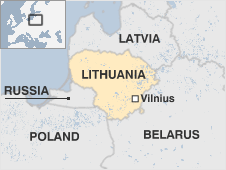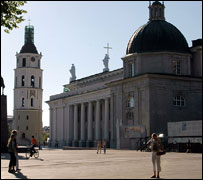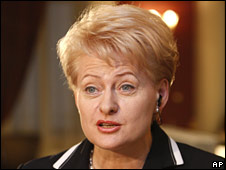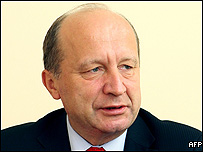Generic Medicines
Taj Pharma is the largest generic pharmaceutical company in India. We hold top positions in different established markets worldwide generics markets..
Lithuania is the largest and most southerly of the three Baltic republics.
 |
Not much more than a decade after it regained its independence during the collapse of the Soviet Union in 1990 Lithuania was welcomed as a Nato member in late March 2004.
The move came just weeks before a second historic shift for the country in establishing its place in the Western family of nations as it joined the EU in May 2004. These developments would have been extremely hard to imagine in not-so-distant Soviet times.
Russia anxious about the implications of the eastward advance of the EU and Nato to include the three Baltic republics has a particular eye on Lithuania which has an important border with the Russian exclave of Kaliningrad.

Vilnius the capital weathered a series of foreign occupations
|
The history of Lithuania has close ties with that of Poland its neighbour to the southwest. By the end of the 18th century most of the country came under the Russian empire. German occupation in the first world war was followed by two decades of independence although Vilnius was occupied by Poland for most of that time.
Following a pact between Stalin and Hitler Soviet troops arrived in 1940. They were pushed out by the Nazis the following year but returned in 1944.
For the next half century of Soviet rule Lithuanians relied on Catholic tradition
and memories of independence to preserve their national identity a skill
mastered through centuries of foreign domination. Pagan traditions with roots stretching back centuries have been kept alive too.
Lithuania has embraced market reform since independence. In the run up to and period following EU entry the republic saw very strong economic growth.
It applied to join the eurozone from January 2007 but was rejected because the inflation rate was too high.
The global financial crisis of 2008 brought a sudden end to Lithuania's boom with annual growth rates of above 8% giving way to forecasts of a 10% contraction of the economy in 2009.
President: Dalia Grybauskaite
Dalia Grybauskaite was voted in as Lithuania's first woman president with an emphatic election victory in May 2009.

Ms Grybauskaite cites Margaret Thatcher as an inspiration
|
She won 69% of the vote against 11% for her closest rival Algirdas Butkevicius of the opposition Social Democratic Party.
Previously the European Union budget commissioner she stood as an independent but with backing from the four-party centre-right coalition of Prime Minister Andrius Kubilius.
A former finance minister Ms Grybauskaite's reputation for plain speaking helped win over an electorate nervous about the severe economic downturn that hit Lithuania in 2008.
She is sometimes dubbed "Iron Lady" the nickname of former British PM Margaret Thatcher a steely reforming conservative she describes as one of her political models.
Ms Grybauskaite has said that her decision to stand came after anger at the economic slump boiled over in a riot in front of the parliament building in Vilnius in January 2009.
She declared herself broadly in support of the governing centre-right's response to the crisis but criticised some of its tax increases and called on some ministers to "correct mistakes of the past or go".
Born in 1956 in Vilnius - then still part of the Soviet Union - Ms Grybauskaite studied in the Russian city of Leningrad - today's St Petersburg.
A senior civil servant since Lithuania's independence in 1990 she served as finance minister from 2001 to 2004 when the country nominated her the European Commission after joining the EU that year.
Prime minister: Andrius Kubilius

Mr Kubilius heads a centre-right coalition
|
Andrius Kubilius is leader of the conservative Homeland Union-Lithuanian Christian Democrats group and served once as prime minister in 1999-2000.
He led this conservative alliance into the October 2008 elections and beat the governing Social Democrats into second place.
His coalition government with three smaller centre-right parties won parliamentary approval in December. Together they hold 80 seats in Lithuania's 141-member parliament.
Mr Kubilius has said his priority is to tackle Lithuania's economic downturn.
A physicist by training he entered parliament in 1992 after involvement in the pro-independence Sajudis movement. He joined the Homeland Union the following year.
Lithuania's private TVs have eroded the public broadcaster's audiences. The radio market is similarly competitive with dozens of stations competing for listeners and advertisers.
Public Lithuanian National Radio and Television (LRT) operates national networks.
The media are free and operate independently of the state. There are no government-owned newspapers.
Nonetheless the national broadcaster has sometimes encountered attempts by politicians to influence its editorial policy.
By March 2008 there were 2.1 million internet users in Lithuania (Internetworldstats).
The press
Television
Radio
News agencies/internet
Delfi - news portal
AFRICA | ASIA-PACIFIC | AMERICAS | EUROPE | MIDDLEEAST | SOUTHASIA
![]()
![]()
![]()
Mauritania Mauritius Morocco Mozambique Namibia Niger Nigeria Republic-of-congo Rwanda Sao-tome-and-principe Senegal Seychelles Sierra-leone Somalia South-africa Sudan Swaziland Tanzania The-gambia Togo Tunisia Uganda Australia Brunei Burma Cambodia China East-timor Fiji Indonesia Japan Kazakhstan Kiribati Kyrgyzstan Laos Malaysia Marshall-islands Micronesia Mongolia Nauru New-zealand North-korea Palau Papua-new-guinea Samoa Singapore Solomon-islands South-korea Taiwan Tajikistan Thailand The-philippines Tonga Turkmenistan Tuvalu Uzbekistan Vanuatu Vietnam Antigua-and-barbuda Belize Bolivia Brazil Canada Chile Colombia Costa-rica Cuba Dominica Dominican-republic Ecuador El-salvador Grenada Guatemala Guyana Haiti Honduras Jamaica Mexico Nicaragua St-kitts-and-nevis St-lucia Suriname Trinidad-and-tobago Uruguay Venezuela Albania Andorra Armenia Austria Azerbaijan Belarus Belgium Bosnia-hercegovina Bulgaria Croatia Cyprus Czech-republic Denmark Estonia Finland France Georgia Germany Greece Hungary Iceland Ireland Italy Latvia Liechtenstein Lithuania Luxembourg Macedonia Malta Moldova Monaco Montenegro Norway Poland Portugal Russia San-marino Serbia Slovakia Slovenia Spain Sweden Algeria Egypt Iran Iraq Israel-and-palestinian-territories Jordan Kuwait Lebanon Libya Mauritania Oman Saudi-arabia Sudan Syria Tunisia United-arab-emirates Yemen Afghanistan Bangladesh Bhutan India Nepal Pakistan Sri-Lanka The-Maldive